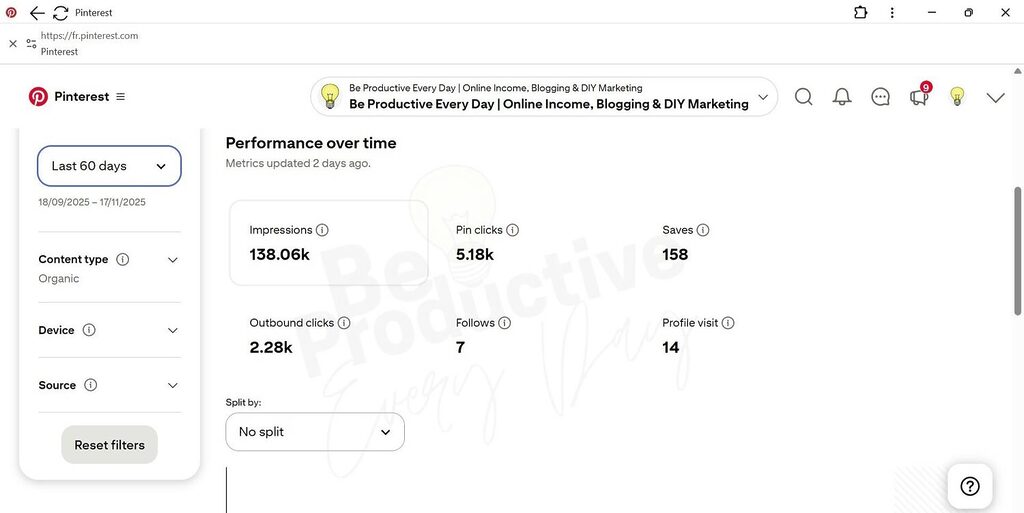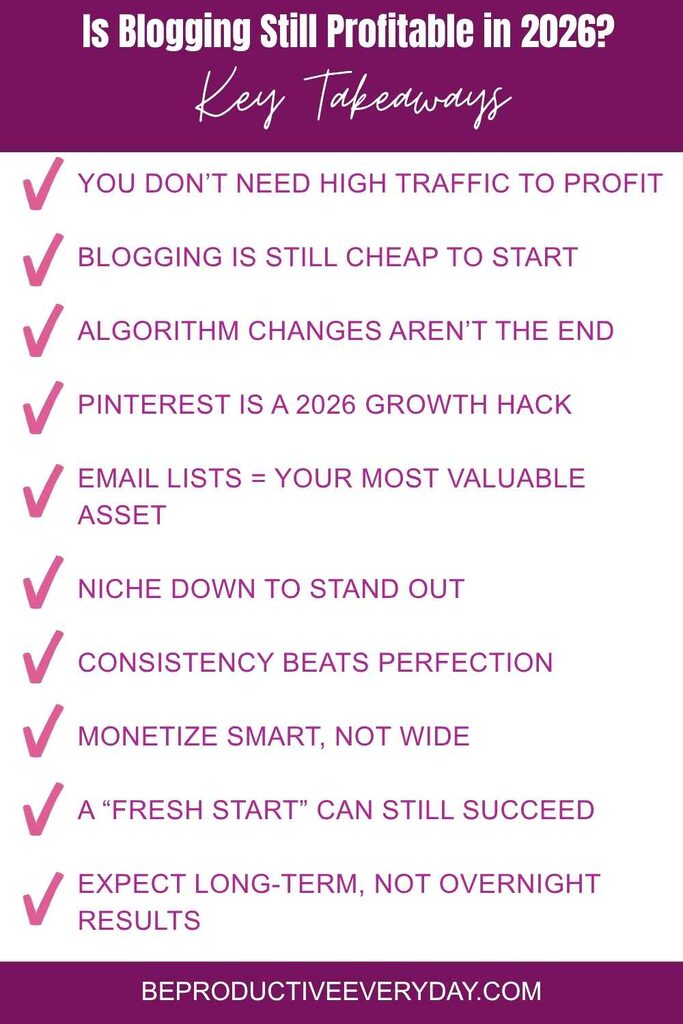I’ve been a side hustle girl for as long as I can remember. Living as a young single woman in an expensive city in France, I had to make my way on my own.
I was a full-time French-English translator and a freelance writer/ghostwriter, but if you know anything about paying taxes in Europe, you know that’s nowhere near enough for a single person with a big dream of owning her own cozy house. (Renting in France is… something else.)
So I did all sorts of things: I sold original illustrations and designs on RedBubble and printables on Etsy, ran a print-on-demand shop for themed clothing, and… I started a blog. In 2016, 10 years ago.
Honestly, I only wanted a cheap marketing alternative to Facebook ads, lol.
It turns out I found out a dozen ways to monetize a blog besides my humble single expectation. 10 years later, I’m still a full-time blogger — but if I were a beginner just starting today?
Would blogging still be profitable for me in 2026? Short answer: yes. I grew a blog from scratch in late 2025, and I still managed to monetize it. In this article, I’ll tell you my real experience with this small blog I’m growing from scratch.

Quick Reality Check: What “Profitable” Even Means in 2026
Let me start this with a question: what does “profitable” mean to you?
A chance to quit your 9-5 job? A path to buy a house? Freedom to travel to Japan? A magical “ctrl+c, ctrl+v” formula to become the next millionaire?
While you think, I’ll tell you that, to me, it means having enough money to:
- stop living paycheck to paycheck
- own a house with a nice view (instead of a hole with barely a window) and stop losing 99% of renting opportunities because landlords “dislike” cats
- make my cats live like queens
- help animal shelters
- travel a few times per year (as opposed to once every 3 years or so)
- have a budget to build a home-based music studio
- have enough free time to create art
I achieved all of the above by blogging. And I’ve just hit the 30s.
But I’ve been blogging for 10 years, and it didn’t happen with *this* small blog.

However, if I were to live solely from this small blog, I’d still be able to:
- pay my rent alone (bu-bye roommates 🫶🏻)
- spoil my cats
- visit Japan once a year
- buy quality art supplies
- spoil myself with expensive Japanese action figures (I’m a nerd, sorry to inform 🤓)
Certainly, much more than the 20-year-old version of me had.
Next, I’d keep refining my blogging strategies. That’s what I did in the past — and it worked. And signs tell me it will work again in 2026.
Would this be profitable enough *to you*?
My 2025–2026 Small Blog Situation
Now let’s finally get to the point you’re here for: how small is my blog and what I can do with it.
See, the small blog in question is Be Productive Every Day. I started this blog in 2021 to talk about my lifelong struggle with productivity and share the tips I’ve learned as a full-time blogger since 2018.
I started earning a minimum income from this blog in 2023 (around €1700 at the time in France). However, I had to maintain two other blogs (my top priorities, since they accounted for most of my income). In the end, I was posting here just occasionally.
Not to mention that I:
- had some health problems
- went through surgery
- couldn’t touch this blog for a year or so.
Result: traffic tanked (from 15,000 to 20-30 monthly views 💀), momentum lost, and algorithm changes hit my blog hard while I was away, and I couldn’t adapt.
In short, I had to rebuild my blog from scratch in 2025, when everyone was saying blogging was dead for beginners and small blogs.
Spoiler: They were lying. And I’m already back up to 5,000 monthly views.
| Have you started your blog already? Don’t keep waiting, sign up for DreamPress and get your blog ready to launch in just a weekend! |
The Pillar-Content Strategy That Got Hit by the Algorithm
Be Productive Every Day used to be a “pillar blog” back in 2022-2023. That means I used to drive thousands of pageviews to this blog with 4-5 pillar posts (4500-6000 words) published per month.
It turns out it’s not what Google wants anymore.
2023–2024–2025 algorithm shifts punished certain content formats, and my blog got hit so hard it was sent to the cemetery. I managed to recover by creating content with stronger search intent matching, restructuring old posts, and relying less on Google-only growth.
Now my content is:
- shorter
- less technical, more personal
- not heavily relied on keyword search
- still helpful, but more accessible
Blogging is still profitable when you never stop learning and improving, diversify traffic sources, and create content that answers real intent.
Starting This Blog From Scratch

My two other blogs’ niches don’t overlap with this one, so I can’t funnel traffic or email subs.
This created a real “new blogger” environment: no backlinks (I never had the time to build a backlink strategy for this blog anyway), no domain authority, nothing pre-built.
Rewriting old posts and shrinking them from ~5,000 words to ~1,400 has been like writing everything from scratch. Still, I’ve revived a dead blog, taking it from ~30 monthly views to ~5,000 in just a few months.
And, at the moment of writing this post:
- I only have 70 published posts
- 35 old posts still need a revamp (so they’re useless at the moment)
- $1,000-$1,200 from the total I’m making monthly is coming from only 5 top-performing posts
See? This is just one example of how profitable a small blog can be in 2026.
Pinterest Is Still Relevant for Niche Blogs in 2026
I’m still recovering from the loss of my Google traffic, little by little.
Currently, I’m getting around 1,000 monthly page views from search engines (such as Google, Bing, and DuckDuckGo) and AI tools (including ChatGPT and Perplexity).
But most of my traffic is coming from my Pinterest, which hasn’t happened for any of my blogs since 2017-2018, resulting in around 4,000 monthly page views. By posting just 1-2 pins per day, I managed to get a few pins going viral, like this one:

2,28k page views (the “outbound clicks” in the graphic) coming from just one pin! And this is just one of my viral pins.
And do you know the best? Viral pins are hardly seasonal. In other words, you still get the same amount (usually more tho) of page views in the next months from the same pin.
Blogging Isn’t Dead in 2026
But you need to crush the “you need 100k views” myth from your head. A small, low-traffic blog can still earn. I’m making enough to make a living from this small blog, with only 5,000 monthly page views, because my traffic converts well.
That is, the only thing that matters is your conversion rate, and that’s directly linked to how intent-matched and helpful your content is.
This is why I earn considerably from affiliate partners:
- I recommend relevant products that I use and trust
- I create deep-trust content
- My traffic is from targeted visitors
- I have a strong email list funnel
- My affiliate partners pay high commissions
That’s why beginners should write genuine, helpful content for readers first (consumers still prefer blogs over ads), not just for ranking, and prioritize monetization strategy over traffic.
Small Blogs Can Still Attract Sponsors
For a small blog, my email inbox surely is busy.
Every month, I get dozens of emails from business owners and brands interested in advertising on my blog, and sometimes, even big guys like Adobe suggest a collab for their Adobe Express launch (I promised myself I wasn’t going to brag — I failed).
And I’m not including the spammers in the math.
Usually, each of these emails earns me:
- $50-$250 right on my PayPal wallet
- an opportunity to write for an established brand
- a high-quality post for my blog
- networking opportunities that may turn into quality backlinks
- the lucky chance of publishing posts that are courtesy of the big guys
Do I even have to keep emphasizing that I’m talking about a blog with less than 10,000 monthly pageviews?
The “Cheap to Start, Cheap to Maintain” Factor (Yes, Blogging Is Still Low-Risk in 2026)
Does anyone actually believe that blogging is expensive?
Here’s your start-up cost: basically hosting + domain. And the ROI is insane compared to other online businesses.
Also, you won’t pay for ads or employees, and most tools are optional.
I’ve started most of my blog on DreamHost’s cheaper plans, just $2.99 per month, but I paid annually because they give you a free domain name on yearly plans, lol.
Currently, I’m on DreamHost’s “DreamPress” plan, a managed hosting plan that handles most of the technical details for me and has top security.
But the main reason I’m on DreamPress is that it is a lot faster than the cheaper hosting — that is:
- my bounce rate decreased from 89% to 55%
- people staying longer on my site means I get more leads
- my Google rankings jumped from position #50-60 to #14-6
So yeah, the $19.95 I invest monthly on DreamPress is definitely worth it, since a single post with good page speed can earn me $500/mo.
So… Is Blogging Still Profitable in 2026? My Honest Answer
Yes — if you treat it like a business, diversify traffic, niche down, and prioritize monetization rather than vanity metrics.
No — if someone expects instant success or relies only on SEO.
After abandoning my blog for over a year due to surgery, I came back to a traffic drop, algorithm changes, outdated content, and a completely cold audience.
However, rebuilding from scratch proved that blogging still works: the blog started rising again, earning again, my posts began going viral on Pinterest, and now I’m even on track to join Journey (Mediavine) despite starting over with zero momentum.
And anyone starting a blog in 2026 can do just the same.
Final Takeaways for Beginners Starting Today

If you’re starting a blog to make money in 2026, the most important thing is to:
- Begin with a focused niche
- Don’t wait till you “have enough views” to think about monetization
- Create genuinely helpful content
- Stay consistent even when growth feels slow
- Treat email as an asset from day one
- Give it 6–12 months of consistent effort
Don’t rely on Google alone—use platforms like Pinterest, build your email list early, and focus on monetization strategies that make sense for your audience. Blogging still works, but it rewards patience, strategy, and persistence far more than overnight expectations.
| Have you started your blog already? Don’t keep waiting, sign up for DreamPress and get your blog ready to launch in just a weekend! |
→ Let’s talk traffic next:
Old SEO Is Dead. New SEO Is More Approachable and Less Robotic.
Here’s everything you need to know!
FAQ
Yes. Blogging still has a strong future, especially for niche sites that offer expertise, helpful content, and diversified traffic sources like Pinterest and email.
AI won’t replace blogging, but it will replace low-quality content. Blogs that share real experience, strong opinions, and unique insights will continue to grow.






